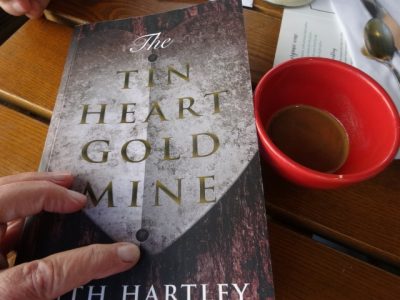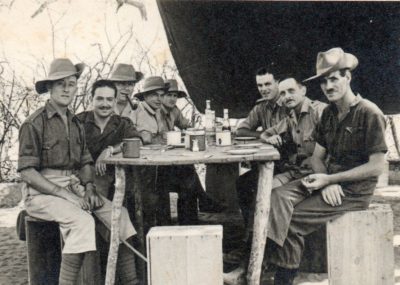Today 11.11.2017 is Armistice Day. Next year is the centenary of the end of World War One. On that day the German East African army was undefeated. It only surrendered on 25.11.1918 two weeks later. The surrender was signed in Zambia at Mbala (Abercorn),- check out the website – all those fascinating facts link to The Tin Heart Gold Mine
Love and War stories

 The Tin Heart Gold Mine is, first of all, a love story. It is the love story of Lara and Oscar and it is the love story of Lara and Tim and it is also a story set in Zambia, a place I love, which in the book I call Chambeshi. I have other agendas as all writers do – I wanted my story to show something different. In The Tin Heart Gold Mine there’s a new angle on Africa – war is part of it as it was of my life.
The Tin Heart Gold Mine is, first of all, a love story. It is the love story of Lara and Oscar and it is the love story of Lara and Tim and it is also a story set in Zambia, a place I love, which in the book I call Chambeshi. I have other agendas as all writers do – I wanted my story to show something different. In The Tin Heart Gold Mine there’s a new angle on Africa – war is part of it as it was of my life.
By the way – this is a photo of me smiling. I’m not giving up writing, even if it is tough – it won’t let me – I have to do it.
The Tin Heart Gold Mine and the War Cemetery
It was a tin heart nailed to a tree on a 1914 – 1918 war cemetery in Zimbabwe that was the germ for this story. The book cover is from a photograph of that tin heart. Of course there is so much more that has provided the background to the novel – the beauty of Zambia, the complexity of the politics of the Cold War and, of course, the international trade in illegal gemstones and ivory. There’s mention of Otto Dix and his grim paintings about the horrors of the First World War – that’s why Armistice Day is important. Hitler banned this kind of art as degenerate because it shows how awful war is. My story though, centres on Lara the artist and her lovers.
Taking things for granted

Soldiers of the Gold Coast Regiment serving in Abyssinia WW2 My father Stephen Hartley second from the right
We all take things for granted. This is evident in our grasp of history. We may know dates and facts but we don’t always understand how or why things happened. Today, the 11th. November – Armistice Day – is the day when the First World War, which we hoped would be the last war ever, ended. Few people realise that the Germans in Tanganyika under Colonel Von Lettow-Vorbeck were not defeated in the First World War African campaign and that it caused millions of African deaths. Few people know that the Burma Campaign in the Second World War was fought and won with African troops. Few people appreciate that 100s of years of European Wars have directly affected Africa and that displaced Europeans and British refugees from European wars chose to come to Africa. It was not only colonial settlers with imperial ambitions who made their homes in places like Zambia.This history is the background to The Tin Heart Gold Mine and explains the character of Oscar, himself a European refugee.
Other writers – other books
Hugh Macmillan’s book Zion in Africa is about this history. William Boyd’s An Icecream War and Karen Blixen’s Out of Africa also deal with this period. Griff Rhys-Jones has made a documentary about the Burma Campaign and his father. My father served with the Gold Coast Regiment like Griff Rhys Jones’ dad but he was not sent to Burma because he became ill with malaria. Keggie Carew’s memoir, Dadland, is about her father’s time in Burma. The photographic book Extraordinary Zambia has a picture of a Burma veteran called Aaron Katonga (pictured alongside).
I shall be posting fewer blogs over the next months as I’m very busy – I am working hard on rewriting two of my books after some encouraging input from two professional editors. I hope also to publish some poetry – and perhaps you may want to read that too.
8 Comments on “Love Stories, World Wars, Armistice Day & why I wrote The Tin Heart Gold Mine”
A very apt link Ruth. There are lonely graves of First World War soldiers dotted along the Northern border of Zambia. Many date from the 1915 attack on Mbala from Kasanga on Lake Tanganyika. Other graves are on the German line of advance in 1918. The Pioneer Cemetery in Mbala held a number of such graves before their removal to the War Graves Cemetery in Ndola.
This incursion into the Northern Province in 1918 was the Germans’ last gasp. General Von Lettow Vorbeck was attempting to escape through Rhodesia to the previous German colony of South West Africa [Namibia] via the Caprivi strip. The rest of their forces had been cleared from East Africa by this date.
There are plans for a Commemoration of the Centennial of the Germans’ final surrender to take place in Mbala on the 25th November 2017.
Thank you for your very interesting comment Colin – this is a fascinating period of history and one that is too often ignored – there really ought to be a BBC documentary about this ready for next year – maybe we should try suggesting it to those who made the documentary about the Burma Campaign? I would love to be in Zambia for this
commemoration – do you think you might go?
Yes Ruth I am planning to go. The problem is the limited accomodation in Mbala and that the bigwigs will corner the best places! James may also come with me. Seems the best oppertunity to take one last look.
Apart from the battle fields etc. there is splendid secenery and waterfalls etc.
A very interesting article Ruth. All war is barbaric and I am surprised by the comment Hitler made about Otto Dix. Good luck with all your rewriting.
Meant to say lovely photo of you!
Ruth, I thought of you, WWII and The Tin Heart Gold Mine today when I read this article in The Guardian:
“Africans who fought for British army paid less than white soldiers – Document reveals more than 500,000 black soldiers were underpaid in second world war” https://www.theguardian.com/world/2019/feb/13/african-british-army-paid-less-than-white-soldiers
The docs also note that Women were paid less than men of equivalent rank (surprise, surprise!).
I wonder if the proposed investigation can possibly result in recompense of any kind?
I spent many weeks in Mbala in 1965 when I was a Platoon Commander with the ZPMU. We were camped initially on the shore of Lake Chila. The purpose of being there was to keep an eye on many thousands of Lenshina followers who had been moved there from various parts of Zambia following the Lumpa disturbances. Their camp was at a place near Lunzuwa which was about 20 kms south of Mbala, and not far from the Congolese border. As the number of Lenshinas increased, we moved later from the lake to be nearer to them.
It was not a particularly difficult assignment especially as the Grasshopper Inn and the Abercorn Arms were in full swing, and we were young, and we could get there for the occasional sundowner.
One evening, I was Orderly Officer, and as I was enjoying a beer in the Inn, one of our NCO’s appeared on the veranda, in a sweat. He had just arrived from Lunzuwa to report that “the Lenshinas have gone, Sah!” Good, said I, before the news sank in. Full speed, we headed off, and it was true. 20,000 or so simply had got up and set off into the Congo. Not a shot fired, no injuries, just nothing! They were never seen again.
I came across some of those who had fled some years later, I think was in December 1968, as they tried to return to Zambia at Mokambo, just outside Mufulira. And that’s another story,
I just mention this, because the whole area around Mbala is quite lovely. Whilst there, I visited many old wartime sites, Kalambo Falls and of course Lake Tanganyika. The owner of the Abercorn Arms, a Mr Parton I think, had a trimaran on the lake at Mpulungu and took us on occasions on trips to Kasaba Bay. Lake Chila to this day conceals many hundreds of old German weapons which were dumped there as they left following the end of WWI.
Hi Paul – this is such an interesting account and also an important piece of Zambian history – all these stories need to be recorded and kept. My latest post is about the way history in Zambia is being forgotten – did you know that KK is not acknowledged in SAHistory online? Its really important for you to start to write your memoir Paul. Please don’t leave it any longer. Perhaps Hugh can write a biography for you about your time in Zambia? Thank you for this comment.